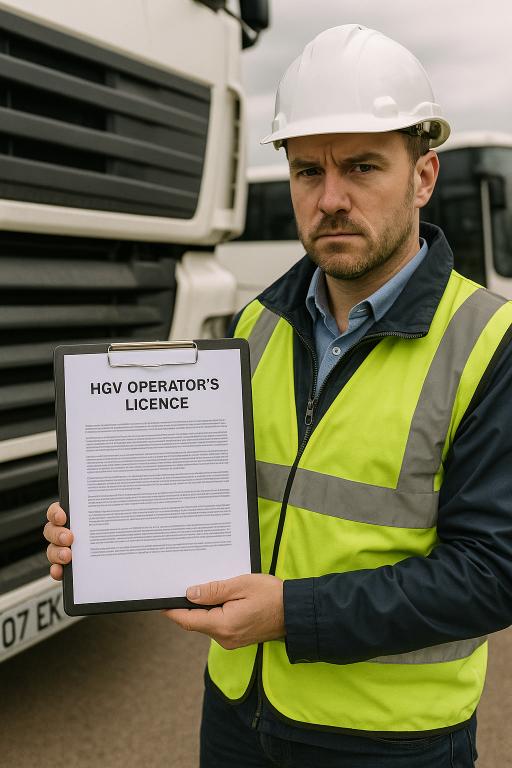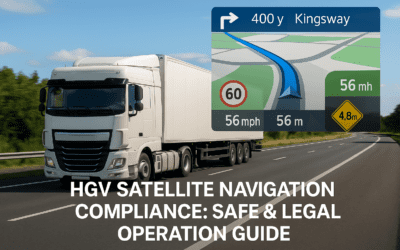Commercial Vehicle HGV / PSV Operator Licence Compliance : How to Stay Legal and Avoid Penalties.

Operating Heavy Goods Vehicles (HGVs) in the UK requires an Operator Licence, that is issued by the Traffic Commissioners for Great Britain. https://www.gov.uk/government/organisations/traffic-commissioners
Holding an operator licence brings specific legal responsibilities designed to ensure that transport operations are safe, roadworthy, and professionally managed.
Failing to comply with the regulations can result in regulatory action being taken against the company, and its drivers and in some cases resulting in fines, vehicle prohibitions, or Suspension, Curtailment or revocation of the operator licence.
Understanding Operator Licence Compliance
Operator Licence compliance means adhering to the conditions and undertakings set out when the operator licence was applied for and granted. https://www.gov.uk/guidance/goods-vehicle-operator-licensing-guide#introduction
These requirements apply to all licence types Standard National, Standard International, and Restricted and form the foundation of legal compliance, safe, and efficient transport management.
Key responsibilities include:
The operator undertakes to make proper arrangements so that:
- The rules on drivers’ hours and tachographs are observed and proper records kept.
- Motor vehicles and trailers are not overloaded.
- Vehicles will operate within speed limits.
- Motor vehicles and trailers, including hired vehicles and trailers, are kept fit and serviceable, as set out in the Guide to Maintaining Roadworthiness.
- Drivers report promptly any defects or symptoms of defects that could prevent the safe operation of vehicles and/or trailers, and that any defects are promptly recorded in writing. As documented in OLMC Policy and Procedures.
- Records are kept (for 15 months) of all driver defect reports, all safety inspections, routine maintenance and repairs to vehicles and trailers and these are made available on request; and
- Ensure drivers comply with Drivers’ Hours and Tachograph regulations. As set out in https://www.gov.uk/drivers-hours/eu-rules
- Download and analyse driver cards no later than every 28 days.
- Download Vehicle head units not later than every 90 days.
- Investigate and record any infringements.
Operating Centre and Vehicle Use
Only use authorised operating centres listed on your licence.
Do not exceed the number of vehicles and trailers authorised.
Record Keeping and Documentation
Maintain up-to-date records for vehicles, drivers, and maintenance.
Ensure all Operator Licence details are accurate and current (e.g. transport manager details, company structure, correspondence address).
Transport Manager Responsibilities (for Standard Licences)
The nominated Transport Manager must have effective and continuous control over transport operations and ensure compliance across all areas.
The Driver Vehicle Standards Agency (DVSA) monitor the use of HGV vehicles and their driver’s by roadside interaction, and by making visits to operators and their operating centres.
The DVSA enforce compliance through roadside checks and operator site visits. Common areas of focus include:
- Vehicle roadworthiness.
- Overloading or insecure loads.
- Drivers’ hours and tachograph misuse.
- Defect reporting systems.
- Maintenance record-keeping.
- Operator Licence display and undertakings.
A Traffic Commissioner has the power to call operators to a Public Inquiry if serious or repeated non-compliance is found and take action against the licence, see more @ https://www.gov.uk/traffic-commissioner
How to Stay Compliant and Avoid Costly Penalties.
To protect your operator licence, adopt a proactive compliance culture:
- Implement a robust maintenance and inspection system
- Keep detailed records and address shortcomings promptly.
- Provide ongoing driver and staff training, ensure everyone understands their legal duties.
- Monitor tachograph analysis reports and driver infringements, correct and document issues with drivers.
- Keep your licence up to date, report any changes to the Traffic Commissioner (e.g. addresses, company name, or number of vehicles).
- Use compliance management software or support services such as OLMC-e https://www.olmcgroup.co.uk/olmc-e-system/ a record and driver management tool.
- Utilise Transport Consultant expertise such as OLMC https://www.olmcgroup.co.uk/about-us/ who can simplify record-keeping and monitoring of your systems and processes.
- Regularly audit your operations by external independent audits help identify gaps before the DVSA does.
Consequences of Non-Compliance
- Failing to comply with Operator Licence conditions can lead to:
- Fixed penalties fines for driver’s roadside.
- Vehicle prohibitions at roadside checks
- Public Inquiry hearing with possible curtailment, suspension, or revocation of your licence
- Loss of repute for the transport manager or / and operators
- Increased insurance costs and reputational damage
Summary
For an operator it is not aspirational to have proper systems in place, it is a mandatory, and a continuous requirement that has been since the licence was first granted. (quote for Traffic Commissioner Mullen)
Therefore, staying compliant with your Operator Licence undertaking and obligations is not just about avoiding penalties, it’s about ensuring safe, professional, and efficient transport operations. Regular monitoring by auditing (https://www.olmcgroup.co.uk/services/compliance-audit/) clear processes, (https://www.olmcgroup.co.uk/shop/) and a proactive approach, will keep your business legal, reduce risk, and maintain your good standing with the DVSA and Traffic Commissioner.
Author: Carl Myers
Website: http://www.olmcgroup.co.uk



